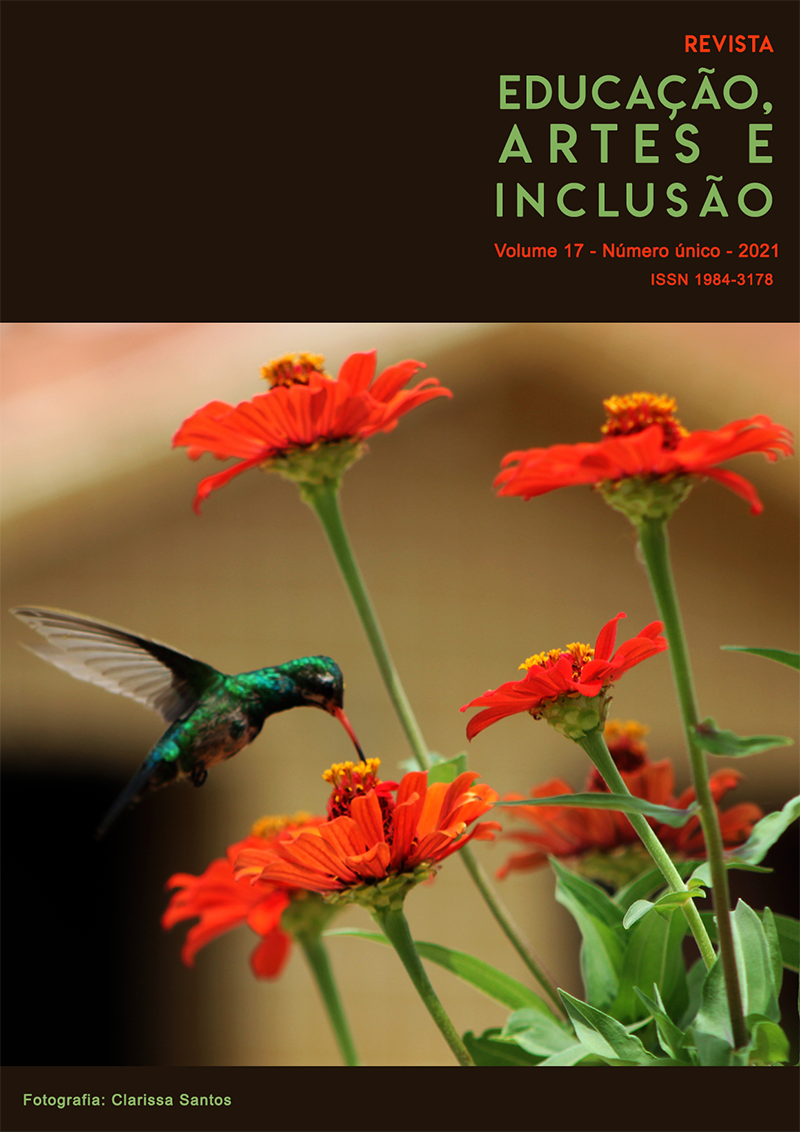Art in school: objectification and freedom
DOI:
https://doi.org/10.5965/19843178172021e0020Keywords:
arts teaching, creativity, aesthetic appropriation, dialecticAbstract
This article aims to understand to what extent the objectifications or artistic works produced by students in the classroom, are art, or are only academic exercises without aesthetic value. We use two central approaches to analyze the present object. The first is how the expansion of a esthetic references present in art history, local, regional and universal, are essential for the development of students' artistic production. Without these references, productions will be bound by common sense. The second focus is the freedom of artistic creation, however, not a freedom generated by the student's abandonment of himself, but a free, personal and at the same time collective poetic creation, planned and guided by art teachers. For the analysis we used some empirical information raised in the internship observations of students of the Degree in Visual Arts at UFMS, carried out between 2017 and 2019 and, mainly, theoretical reflections on free aesthetic objectification as antagonistic to repetitive, alienating pseudoartistic activities. We are based on the work of several authors, from the same philosophical perspective, who use the concepts of objectification, freedom, human activity and the dialectical relationship between thesingular and the universal, in education and aesthetics.
Downloads
References
ARGAN, Carlo Giulio. Arte Moderna. São Paulo. Cia das Letras. 1992.
BARBOSA, Ana Mae. Tópicos utópicos. Belo Horizonte. Ed. Arte. 1998.
BOURDIEU, Pierri. As regras da arte. São Paulo. Cia das Letras. 1986.
DUARTE JR, João Francisco. Fundamentos estéticos da educação. Campinas. Papirus. 1994.
DUARTE, Newton. Vigotski e o “aprender a aprender”: crítica às apropriações neoliberais e pós-modernas da teoria vigotskiana. Campinas. Autores Associados. 2001.
DUARTE, Newton. A individualidade para si: uma contribuição a uma teoria histórico-cultural da formação do indivíduo. Campinas. Autores Associados. 1999a.
DUARTE, Newton. Educação escolar, teoria do cotidiano e a escola de Vigotski. Campinas. Autores Associados. 1999b.
FERNANDEZ, Vera Lucia Penzo. A criatividade no ensino de artes visuais. Curitiba. APPRIS. 2016.
FERRAZ, Maria Heloisa C. e FUSARI, Maria F. de Resende. Metodologia do ensino de arte. São Paulo. Cortez. 1991.
GOMBRICH, E. H. História da Arte. São Paulo. Círculo do Livro. 1972.
HAUSER, Arnoud. História social da arte e da literatura. São Paulo. Editora Mestre. 1982.
HEGEL. Coleção os pensadores. São Paulo. Nova Cultural. 1991.
HEGEL. Fenomenologia do espírito. Petrópolis. Vozes. 1992.
HELLER, Agnes. O cotidiano e a história. Rio de Janeiro. Paz e Terra. 2008.
JANSON, H. W. História Geral da Arte. São Paulo. Martins Fontes. 2001.
LEONTIEV, Alexis N. O desenvolvimento do psiquismo. Lisboa. Horizonte. 1978.
LEONTIEV, Alexis N. Actividad, conciencia y personalidad. Pueblo e Educación. Habana. 1983.
LUKÁCS, György. O jovem Marx e outros escritos de filosofia. Rio de Janeiro. UFRJ. 2009.
LUKÁCS, György. Introdução a uma estética marxista: sobre a particularidade como categoria da estética. Rio de Janeiro. Civilização Brasileira. 1970.
LUKÁCS, György. Arte e sociedade: escritos estéticos 1932-1967. Rio de Janeiro. UFRJ. 2011.
MÁRKUS, Gyorgy. A teoria do conhecimento no jovem Marx. Rio de Janeiro. Paz e Terra. 1974.
MARX, Karl. Manuscritos econômico-filosóficos. São Paulo. Boitempo. 2004.
MARX, Karl. Sobre a questão judaica. São Paulo. Boitempo. 2010.
OLIVEIRA, Avelino da Rosa. Marx e a liberdade. Porto Alegre. EDPUCS. 1997.
PAES, Paulo Cesar Duarte; SERUTTI, Aline Sesti; NECESSIAN, Maria Celéne. Relatórios de estágio do ensino fundamental e médio: Artes Visuais, 2016/17. Campo Grande. UFMS. 2017 (mímeo).
SACCOMANI, Maria Cláudia da Silva. A criatividade na arte e na educação Escolar (Dissertação de Mestrado). Araraquara. UNESP. 2014.
SAVIANI, Dermeval. Pedagogia Histórico-Crítica. Campinas. Autores Associados. 2003.
VÁZQUEZ, Adolfo Sánchez. As ideias estéticas de Marx; tradução de Carlos Nelson Coutinho. 2ª edição. Rio de Janeiro, editora Paz e Terra, 1978.
VIGOTSKI, L. S. Psicologia da arte; tradução Paulo Bezerra. São Paulo, SP: Editora Martins Fontes, 2001a.
VIGOTSKI, L. S. Psicologia pedagógica. São Paulo. Martins Fontes. 2001b.
VIGOTSKI, L. S. A construção do pensamento e da linguagem; tradução Paulo Bezerra. São Paulo. Martins Fontes, 2001c.
VIGOTSKI, L. S. Imaginação e criatividade na infância. São Paulo. Martins Fontes. 2014.
VYGOTSKI, L. S. El problema del desarrollo de las funciones psíquicas superiores (Obras Escogidas, Volume III). Madri. Visor. 1995.
Downloads
Published
How to Cite
Issue
Section
License
Copyright (c) 2021 Jusimara Clara Ozorio, Paulo Cesar Duarte Paes

This work is licensed under a Creative Commons Attribution-NonCommercial 4.0 International License.
Copyright Statement
The Educação, Artes e Inclusão is a journal that follows the Free Access Policy. The articles published by the journal are free of charge, intended for educational and non-commercial applications. The articles whose authors are identified represent the expression from the point of view of their authors and not the official position of the Educação, Artes e Inclusão Journal or the Educação, Artes e Inclusão Research Group.
Authors who publish in this journal agree to the following terms:
(A) Authors retain the copyright and grant the journal the right of first publication, with the work simultaneously licensed under the Creative Commons Attribution License which allows the sharing of the work with acknowledgment of authorship and initial publication in this magazine.
(B) Authors are authorized to take additional contracts separately, for non-exclusive distribution of the version of the work published in this journal (eg publish in institutional repository or as a book chapter), with acknowledgment of authorship and initial publication in this magazine.
(C) This journal provides public access to all of its content, as this allows for greater visibility and scope of published articles and reviews. For more information on this approach, visit the Public Knowledge Project.
This journal is licensed under a Creative Commons Attribution-NonCommercial-ShareAlike 4.0 International License. This license allows others to remix, adapt and create from your work for non-commercial purposes, and although new work must give you due credit and cannot be used for business purposes, users do not have to license such derivative works under the same terms.



